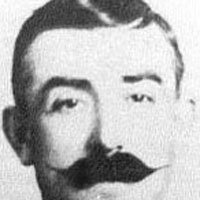David Ashworth

Born: Blackpool, 1868 died: Blackpool, 23rd March 1947
1st July 1924 - 1st November 1925
The early years of David Ashworth’s life have been chronicled incorrectly over the years. According to most reports he was born at Waterford in Ireland around 1868, but the 1881 census claims he was actually born in Blackpool. It does appear the Waterford line is incorrect, however the story is a little confusing as by 1881, when he was 13, David was living with his grandmother, Elizabeth Ashworth, at Newchurch, near Rawtenstall in Lancashire. The only other person living at that address was 24 year old Elizabeth Alice Ashworth who was described as Elizabeth’s daughter. As the surname of all three residents are the same, and the two ladies were both born in Newchurch, it seems likely that David was living with his paternal grandmother and auntie.
As he grew he became interested in football and is known to have played for Newchurch Rovers. He went on to become a Football League referee before his first managerial appointment with Oldham Athletic in 1906. At Boundary Park Ashworth guided Oldham from the Lancashire Combination to the First Division within four years. Oldham’s promotion in 1910 was as runners-up to City.
A spell at Stockport County followed throughout the war years, then in December 1919 he became Liverpool’s manager, bringing them the title in 1921-22. The Merseysiders retained the title the following year, but midway through that season he shocked the Liverpool directors by rejoining Oldham. After only a year with the Boundary Park club he became City’s manager in July 1924.
At Maine Road, his first season saw the Blues finish tenth, and Ashworth made at least one notable signing – Sam Cowan. Cowan was purchased in December 1924 from Doncaster and went on to become a major star. During the following close season he strengthened the squad further by purchasing left back Phil McCloy from Ayr United for £3,000. It was another good signing but the Blues struggled during 1925-26. Only two of the opening ten games ended in victory and it was clear to all that Ashworth was finding it difficult to create the entertaining style of play the Blues had been used to.
An embarrassing 8-3 defeat at Sheffield United on 26th October brought a great deal of anguish to those associated with the Club, and shortly afterwards with the pressure mounting Ashworth resigned, although it seems likely he was ‘pushed’.
After City he had a brief spell with Walsall, and then managed two Welsh non-League clubs, Caernarfon & Llanelli, before returning to the English game as a scout for Blackpool before the war. He died in 1947 at the Blackpool Victoria Hospital aged 79.
Ashworth was probably the first City appointment that actually failed. Each of his predecessors had achieved some form of success and had managed to last at least two seasons, while Ashworth was only in charge for around 16 months. This was an extremely short spell at this time in football history.
All history and statistical material has been produced based on the research and writing of Manchester football historian Gary James (www.facebook.com/GaryJames4). It is maintained by Ric Turner & Gary James. All text remains the copyright of the original contributors.
Gary's book, Manchester - the City Years: Tracing the Story of Manchester City from the 1860s to the Modern Day, is available to order on Amazon.